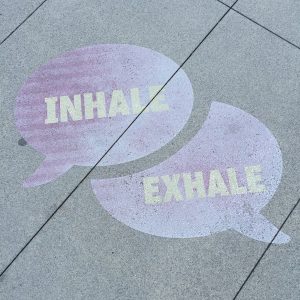Many patients with advanced lung cancer can sometimes feel short of breath even when they are on oxygen and showing that they have an acceptable oxygen level of over 90%. There are a few reasons why this can happen.
 If your oxygen level drops below 88% this signals to the brain that you need more oxygen and initiates dyspnea (shortness of breath) and a sense of air hunger. This signal is also triggered when other pulmonary test levels are low. The Vital Capacity is how much air there is from the beginning to the end of a breath and the FEV1 is a measure of how much air you can forcefully exhale in one second. Even when your oxygen levels are good at 90% if any of the other values are low then the body can sense dyspnea.
If your oxygen level drops below 88% this signals to the brain that you need more oxygen and initiates dyspnea (shortness of breath) and a sense of air hunger. This signal is also triggered when other pulmonary test levels are low. The Vital Capacity is how much air there is from the beginning to the end of a breath and the FEV1 is a measure of how much air you can forcefully exhale in one second. Even when your oxygen levels are good at 90% if any of the other values are low then the body can sense dyspnea.
The use of an inhaler can be very effective in improving the Vital Capacity and FEV1 and can immediately improve breathing symptoms and stop the feeling of shortness of breath due to the effect the inhalers have on widening the airways.
Also many patients can be not very physically fit due to a combination of the medical illness, age and obesity. Introducing more exercise into daily life can help to improve cardio/respiratory fitness thereby improving the Vital Capacity and FEV1 and helping to reduce the frequency of periods where you feel short of breath.
Low blood counts (anaemia), heart disease and advanced kidney disease are conditions that can also cause dyspnea even if your lungs are working effectively.
Vital capacity and FEV1 are pulmonary tests that your doctor can perform to see how effectively your lungs are working so regular check-ups are important and your doctor can help ensure that if you suffer from these situations that they are treated to help improve your breathing. Some patients find that when these other factors are dealt with that they are less reliant upon their oxygen.
If you suffer from bouts of breathlessness then there are things you can do to help yourself:
• If you smoke, get help to quit.
• Try some breathing techniques. If you practise these and use them every day, they will help you when you are active and getting breathless. They will also help you manage if you get short of breath suddenly.
– Blow as you go: breathe out when you are making a big effort, such as standing up, stretching or bending.
– Pursed-lips breathing: breathe out with your lips pursed as if you were whistling.
• Be more physically active. Physical activity could be walking, gardening, walking the dog, housework or swimming as well as going to a gym. If you have a lung condition, you can be referred to a pulmonary rehabilitation (PR) programme by your doctor, and if you have a heart problem there are cardiac rehabilitation services too. These classes help you to get control over your breathlessness, get you fitter and are also lots of fun.
• Drink and eat healthily and manage your weight. If you are carrying excess weight you will require more effort to breathe and move around, and it will be more difficult to get control over your feelings of breathlessness.
• Get treatment if you feel stressed or anxious.
• Use the right medication in the right way. If you use inhalers, tablets or liquids to control your breathing ensure you know how and when to take them correctly.
• Ensure your oxygen flow rate is correct. Another reason why regular check-ups are important so your doctor can monitor your oxygen requirements and adjust your oxygen flow rate accordingly for your oxygen concentrator.
References: http://www.coalitionforpf.org and http://www.blf.org.uk




